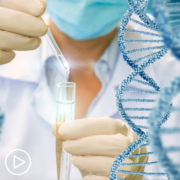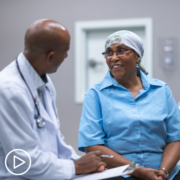Empowered by Biomarker Testing: Amber’s Journey with Stage IV NSCLC
Empowered by Biomarker Testing: Amber’s Journey with Stage IV NSCLC from Patient Empowerment Network on Vimeo.
Amber, a 56-year-old living with stage IV non-small cell lung cancer (NSCLC), shares her journey of empowerment through biomarker testing and targeted therapy. From recognizing symptoms and proactive healthcare to managing her condition with the latest treatments, Amber’s story emphasizes the importance of personalized care and staying informed. Her advocacy for biomarker testing and clinical trials aims to inspire others facing similar challenges to take an activated approach in their lung cancer care.
Download Resource Guide | Descargar guía de recursos
See More from [ACT]IVATED NSCLC Biomarkers
Related Resources:

|
 How Can We Leverage Lung Cancer Biomarker Data to Address Health Disparities How Can We Leverage Lung Cancer Biomarker Data to Address Health Disparities |

What Are the Noted Disparities in Lung Cancer Screening and Access? |
Transcript:
Embracing an activated approach to non-small cell lung cancer (NSCLC) care is indispensable for every patient. My name is Amber, I am 56 years old and living with non-small cell lung cancer. Recognizing the importance of proactive healthcare and being in good physical condition, I sought medical attention upon experiencing troubling symptoms.
I was 54 when I started experiencing symptoms of coughing, wheezing, and decreased stamina. I worked as a nurse practitioner and knew lung cancer can happen to anyone with lungs. After getting a CT scan, they discovered a spot on my lung and swollen lymph nodes in my chest. A PET scan and brain scan came next to help determine my diagnosis.
I was shocked to learn I had stage IV lung cancer that spread. My oncologist knew about the latest in biomarker testing and immediately scheduled it, which determined I was EGFR-positive. Even though that sounded frightening, I learned there was targeted therapy that worked well for EGFR-positive patients.
I’ve been on this EGFR blocker since my diagnosis. My tumor is no longer visible, and my lesions have decreased considerably. I’m monitored regularly and stay active hiking and spending time with my family. I’m so thankful biomarker testing enabled my care team to prescribe targeted therapy. It’s a huge advancement in lung cancer care. And if you’re a former smoker and are unsure when to start lung cancer screening, ask your doctor. Even if you smoked many years ago, you should continue to receive lung scans.
I hope that sharing my story will help other patients understand the importance of biomarker testing.
Here are my activation tips:
- Ask your care team questions to learn about biomarker testing, treatment options, and what to expect during and after treatment.
- Don’t allow stigmas to keep you from getting the best personalized lung cancer care.
- Ask if a clinical trial may be a potential treatment option for your type of lung cancer.
Remember, no matter who you are and what kind of health history you have, being proactive is everything. Stay activated by being informed, empowered, and engaged in your lung cancer care.
Share Your Feedback
Create your own user feedback survey






